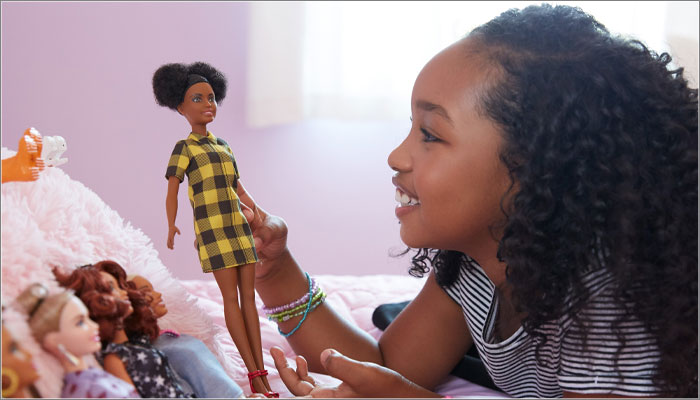Playing with dolls helps children develop empathy skills, reveals study from Cardiff University and Barbie

Barbie and a team of neuroscientists from Cardiff University conducted a study that has found that doll play activates brain regions that allow children to develop empathy and social information processing skills, even when playing by themselves.
Over the past 18 months, senior lecturer Dr. Sarah Gerson and colleagues at Cardiff University’s Centre for Human Developmental Science have used neuroimaging technology to provide the first indications of the benefits of doll play at a brain level.
Through monitoring the brain activity of 33 children between the ages of 4 and 8 as they played with a range of Barbie dolls, the team found that the posterior superior temporal sulcus (pSTS), a region of the brain associated with social information processing such as empathy, was activated even when the child was playing on their own. These benefits of solo doll play were shown to be equal for both boys and girls.
“This is a completely new finding,” said Dr. Gerson.
“We use this area of the brain when we think about other people, especially when we think about another person’s thoughts or feelings. Dolls encourage them to create their own little imaginary worlds, as opposed to say, problem-solving or building games. They encourage children to think about other people and how they might interact with each other.
“The fact that we saw the pSTS to be active in our study shows that playing with dolls is helping them rehearse some of the social skills they will need in later life. Because this brain region has been shown to play a similar role in supporting empathy and social processing across six continents, these findings are likely to be country agnostic”.
To gather the data for the study, the children’s play was split into different sections so the Cardiff team could capture the brain activity relating to each other kind of play separately: playing with the dolls on their own; playing with the dolls together with another person (the research assistant); playing with the tablet game on their own and playing with the tablet game along with another person (the research assistant).
The dolls used included a diverse range of Barbie dolls and play sets, with all Barbie dolls and sets returned to starting positions before each child began their test to ensure consistency of experience. Tablet play was carried out using games that allow children to engage with open and creative play (rather than a rule or goal-based games) to provide a similar play experience to doll play.
The findings of the study show that when children played alone with dolls, they showed the same levels of activation of the pSTS as they do when playing with others. Another finding of the study is that when children were left to play tablet games on their own, there was far less activation of the pSTS, even though the games involved a considerable creative element.
To understand the relevancy of these neuroscience findings, Barbie independently commissioned a global survey that asked more than 15,000 parents of children in 22 countries. Results of this showed 91 percent of parents ranked empathy as a key social skill they would like their child to develop, but only 26 percent were aware that doll play could help their child develop these skills.
“As leaders in the dolls category, we’ve always known that doll play has a positive impact on kids, but up until now, we have not had neuroscientific data that demonstrates these benefits,” said Lisa McKnight, SVP and Global Head of Barbie and Dolls, Mattel.
“The findings of this research highlights that playing with dolls, such as Barbie, offers positive benefits in preparing children for the future through nurturing social skills like empathy. As we continue to inspire the limitless potential in every child, we are proud to offer dolls that encourage skills we know are highly valued by parents and are determinants in children’s future emotional, academic, and social success.”
Barbie will be supporting these findings with an online hub, Barbie.com/BenefitsOfDollPlay, featuring resources for parents, caregivers, and children, to assist them in enhancing and applying their social processing skills.
Dr. Sarah Gerson and the Cardiff University team along with Mattel, have committed to further neuroscience studies in 2021.
—-
To stay in the loop with the latest news, interviews and features from the world of toy and game design, sign up to our weekly newsletter here






















